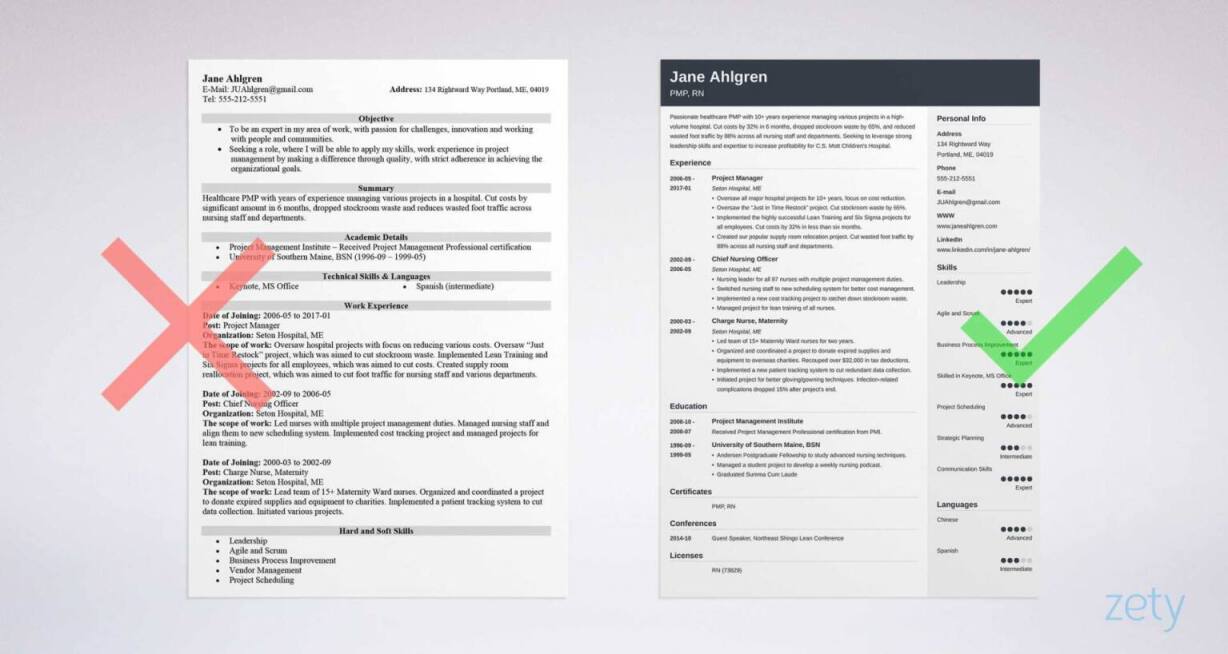What Are Hard Skills? Best Hard Skills Examples in 2026
Create your CV nowNo matter your position, we’ve all developed the expertise necessary to carry out the day-to-day tasks of our jobs. These job-specific abilities are also known as hard skills and they’re an essential part of a well-written CV.
Read on and you’ll learn exactly what hard skills are and get a hard skills list you can refer to when you’re writing your CV. We’ll also take a look at what hard skills are currently in demand and how you can expand your skill set to improve your career prospects.
Want to save time and have your CV ready in 5 minutes? Try our CV builder. It’s fast and easy to use. Plus, you’ll get ready-made content to add with one click. See 20+ CV templates and create your CV here.
Sample CV made with our builder—See more CV examples here.
And once your hard skills list is written, take a look at our other CV guides:
- School Leaver CV Example & Guide
- Career Change CV Example & Guide
- Chef CV Example & Guide
- CV for a 16-Year-Old Example & Guide
- Internship CV Example & Guide
- Teaching Assistant CV Example & Guide
- Graphic Designer CV Example & Guide
- Academic CV Example & Guide
Hard Skills Examples on a CV
Johnny Singh
Ph: 0777 7777 777
Email: j.singh.zety@gmail.com
User-focused front end developer with 2+ years experience coding HTML, CSS and JavaScript. Passionate about user-friendly design with a focus on mobile website development. Dedicated to implementing clean visuals and optimal loading times. Seeking to grow my experience in a large corporate team at Fastech Inc.
Work Experience
Front End Developer
Tidy Web Design, London
August 2017–Present
- Redesigned websites for major corporate clients leveraging responsive design to improve user engagement and increase conversion by an average of 120%.
- Developed cross-browser compatible websites, coding in HTML5 and CSS2 and 3.
- Utilised JavaScript and AJAX to create highly efficient client-side scripting.
- Advised on and implemented technical SEO improvements helping to boost average CRO rates.
Education
BSc Computer Science, September 2014–June 2017
Royal Holloway University of London
Skills
- HTML & CSS. Skilled in coding mobile-optimised websites.
- Testing/debugging. Able to rapidly identify and resolve functionality issues.
- Command-line. Competent in advanced command-line techniques, achieving an input speed 10% faster than GUI.
- Responsive design. Confident in creating adaptable solutions cross-browser and platform functionality.
- Grunt. Able to leverage automated image optimisation techniques and CSS/JS minifying.
Languages
- Hindi—C2
Expert Curated Video Content
If you prefer watching, our Certified Professional CV Writer, Caio, will share the best hard skills for your CV!
What Are Hard Skills?
Hard skills are abilities that can be easily taught and measured. Examples include proficiency in a foreign language, mathematical ability or ability to operate a piece of machinery. They’re often job-specific and can be obtained through formal education and training.
Contrast this with soft skills, which are harder to define, learn and measure, and relate to the way you interact with other people. Examples include leadership skills, communication skills, and teamwork skills.
So think about it this way, it’s easy to test if you can speak a foreign language. But it’s much harder to create a simple test to prove your leadership skills, that takes time and is much harder to quantify.
And why are hard skills important? That’s easy, they’re essential to successfully carrying out our jobs. A bus driver has to know how to drive a bus. An accountant needs to be able to prepare and examine financial records. And I need to be able to write.
Lastly, it’s worth noting that in one sense soft skills take precedence over hard skills. According to one study when employers were asked to describe the most important skills in their employees, 75% of them described a soft skill. But—
Hard skills are still essential to your career. They’re the basic foundation that lets you function whilst soft skills are the additional elements that help you excel.
So now we know that they are, let’s take a look at some hard skills examples.
Top 10 Hard Skills Examples
Here’s the part you’ve been waiting for, our carefully curated list of hard skills examples. We’ve chosen the top 10 hard skills categories to help prove your prowess.
1. IT Skills
Search for a "list of the top hard skills" and chances are your results will be dominated by tech skills. The IT industry continues to experience strong growth and there’s a real shortage of IT skills in all sectors. Here are some examples that would look great on your CV. The very first skill in our number one category is the top hard skill according to LinkedIn.
- Blockchain
- Cloud computing
- Cybersecurity
- Artificial intelligence
- Mobile development
- Virtual reality
- Internet of things (IoT)
- Machine learning
- Networking and wireless
- UI/UX design
Pro Tip: There’s no need to mention basic computer skills on your CV such as creating PowerPoint presentations or using Gmail (everyone expects you can do it). So unless you can show off with a certification such as MOS Master or the profession requires it, save space on your CV for your other skills.
2. Analytical Skills
A defining aspect of today’s world is the way that everything is broken down into data, which is used to inform decisions in every job industry. From simple decisions like how much stock a shop should order, to complex ones like allocating government funding, it’s all data-driven. Here’s how to show you've got great analytical skills.
- Database management
- Data processing
- Mathematical skills
- Deductive reasoning
- Research
- Reporting
- Critical thinking
- Deductive reasoning
- Data entry
- Business analysis
3. Marketing Skills
Marketing skills enable you to promote products, services and concepts. They’re particularly important for careers in media, advertising and e-commerce but any job that involves promoting a product or service will benefit from marketing skills. Here are some of the top examples.
- SEO & SEM
- Content marketing
- Video
- Social media
- Copywriting
- CRM tool knowledge
- CMS tool knowledge
- CRO and A/B testing
- Photoshop skills
- Data visualisation
4. Technical Skills
They’re sometimes presented as a third skills category, separate from hard and soft skills, but really these are a specialised form of hard skills. Technical skills involve the ability to perform specific tasks, most often in relation to mechanical, IT and STEM jobs. Here are a few job-winning examples.
- Programming
- Point of Sale equipment and software
- Bookkeeping (e.g. Quickbooks and Sage)
- Inventory management
- STEM skills
- Web development
- Business intelligence
- Help desk and technical support
- Software testing
- Customer service systems
And these are the top tech skills according to data from Hiring Lab.
- SQL
- Java
- Python
- Linux
- JavaScript
- AWS
- C++, C and C#
- .net
Then as a final bonus, these are the five fastest growing tech skills, all have experienced 1000% plus growth in the past five years. You read that right, one thousand percent.
- Docker
- IoT
- Ansible
- Kafka
- Azure
5. Project Management Skills
It seems every second job going is for a project manager of some description. But these skills have a much broader use too. Any job that involves working with a team towards a defined goal needs good PM skills.
- Process management
- Project planning
- Risk management
- Scheduling
- Budgeting
- Procurement
- Agile software
- Scrum management
- Kanban
- Project life cycle management
6. Writing Skills
Writing skills are seen as critical to achieving workplace success. Different jobs need different types of specialist writing abilities. Here are some examples.
- Academic writing
- Editing
- Proofreading
- Report writing
- Blog writing
- Journalism
- Creative writing
- Social media writing
- Content writing
- Technical writing
7. Language Skills
We’ve already touched on this one. But language skills will always help set you apart from the competition so it’s worth repeating. Use a separate languages section and describe your ability using the CEFR, e.g. French—C2
And remember to work it into other parts of your CV too, like your work experience section. E.g. ‘Provided outstanding customer support in Dutch to Benelux clients’.
8. Design Skills
The ability to create compelling visual design is increasingly important in our consumer-driven online economy. It’s not just for graphic designers and artists anymore. Here are some design skills ideas.
- Basic HTML coding
- Typography
- Colour theory
- UI/UX design
- Photoshop
- InDesign
- Illustrator
- Photography
- Print design
- Branding
9. Hard Skills for Managers
Management skills can be split between soft and hard skills. Leadership and charisma fall under the soft skills heading, but there are key hard skills needed for effective management too. Here are some examples.
- Knowledge of HR and hiring processes
- Familiarity with employment law
- Forward planning
- Managerial psychology
- Coaching skills
- Process improvement
- Commercial awareness
10. Certifications & Licenses
While not technically a hard skill in and of themselves, certificates and licences provide clear proof that you possess certain abilities. So always showcase them on your CV as a separate section, particularly if they’re relevant to the job you’re applying for. For example:
Certifications
- CIPD Level 5 Diploma in Human Resource Management
This list of hard skills is all well and good, but what if your own skills need improvement? Thankfully improving your hard skills is easy, and that’s what we’ll cover next.
When making a CV in our builder, drag & drop bullet points, skills, and auto-fill the boring stuff. Spell check? Check. Start building your CV here.
When you’re done, Zety’s CV builder will score your CV and tell you exactly how to make it better.
How to List Hard Skills on Your CV
There are as many types of hard skills as there are types of job. In the next chapter, we’ll take a look at some common examples and break them up into categories. But whatever you do, don’t just treat it as a pick and mix. You have to choose the right hard skills for your career. So first, let’s take a look at the best way to choose what to include in your CV.
How to Choose Hard Skills for Your CV
First, take a look at the job advert, it’s an easy guide to the skills the hiring manager wants. Here’s an example from a real posting.
To be successful in this role you'll need:
- Previous experience of and working in SAP R/3 Enterprise 4.6 and 4.7, IS-Retail, MM and SD modules, ANSI SQL, SAP Basis.
- Able to develop and maintain standard ABAP reports, ABAP objects, IDOCs, BAPIs, User-Exits, Smartforms, Data dictionary.
- A logical thinker to design system solutions to business problems.
- Patient, curious and cautious enough to investigate and work out the right solution with the business.
- Continuous improver on existing solutions without fear of refactoring to make reusable or perform better.
- Multi-lingual in programming languages, database and operating systems.
That example comes from an advert for an SAP software engineer. As an IT role, it requires specialised hard skills. All the bullet points you see highlighted are hard skills that are essential to be able to perform the job effectively.
But you can’t just copy and paste those bullet points into your CV. It looks obvious and spammy and the recruiter will see right through it. Here’s how to do it properly.
- Highlight the hard skills in the job advert like in the example above. Then make a list of them.
- Next, write another list consisting of your own hard skills. Take into consideration all the hard skills you’ve gained from your work experience and education.
- Then compare the two lists, see what matches and choose 5–10 skills to include in your CV skills section.
And don’t just write a list of skills. You have to add some proof to your claims, so add a sentence beside each skill explaining your aptitude in it. E.g. Programming languages. 10+ years experience in coding Python, JavaScript, and C++.
Where to List Your Hard Skills
Hint, it doesn’t stop with your skills section. You should work in your hard skills throughout your CV, especially your work experience section. Here’s an example.
- Used Sage Business Cloud Accounting to process accounts payable, working efficiently to consistently achieve the top processing speed in the team.
That bullet point comes from a CV for an accounts payable specialist. As you can see they’ve neatly worked in a software skill combined with an impressive achievement. But don’t stop there, you can also integrate hard skills into your CV summary.
Performance-driven business analyst with 10+ years of experience. Master of SQL and Google Analytics with a passion for clear and understandable data visualisation. Seeking to efficiently leverage analytics with Agile workflow to identify potential user adoption issues and help drive Nilex Solutions to new heights of success.
That’s an example from a business analyst and it’s full of job-winning hard skills. We’re not done yet though. Hard skills can also be incorporated into additional CV sections.
Languages are the most obvious hard skill that you can include as an extra section. If you can speak a foreign language then always include a languages section on your CV. It’s a proven method of increasing your chances of success.
And if you’re writing a graduate CV or a student CV, then a hobbies and interests section could prove useful. It’s the perfect way to add extra hard skills if you don’t have much work experience. For example:
Hobbies & Interests
- Game modding. Minecraft enthusiast and custom map creator for Skyrim.
That’d be a great example for someone starting out an IT career, particularly in game development. It demonstrates real hard skills and will be a great conversation starter in the job interview too.
And by the same token your education itself is an excellent way of showing off hard skills. Add some more detail to your CV education section to highlight relevant skills. For uni graduates you can include bullet points on specific modules you’ve studied to prove your knowledge. And you can also include information on school/uni projects and extra-curricular activity. For example:
BSc Business Management, September 2015–June 2018
University of Birmingham
- Key modules—Fundamentals of Leadership, International Human Resource Management, Crisis Management.
- Extracurricular activities—active member of the Future European Business Leaders student organisation.
So the trick is to have a golden thread of hard skills running throughout your CV structure. By doing this you really cement the proof of your abilities.
Pro Tip: You may have read about something called a skills-based CV. As the name suggests, it puts the spotlight on your transferable skills instead of your work history. But the vast majority of candidates are best off using the traditional chronological CV format. Skills-based CVs are notoriously difficult to write and they’re like Kryptonite to recruiters.
Plus, a great cover letter that matches your CV will give you an advantage over other candidates. You can write it in our cover letter builder here. Here's what it may look like:
See more cover letter templates and start writing.
How to Improve Hard Skills
You don’t just have to rely on gaining hard skills through experience. One of the easiest ways to define hard skills is that they’re easily teachable, and there are more options than ever available to learn them. Here’s what to do.
1. Ask your employer what training is available
Most good businesses recognise the need to empower and upskill their staff. Ask your employer about internal training opportunities as your first port of call.
2. Make use of government led training schemes
For example, the government has just set up a new online learning platform. And you can also access training via the National Careers Service if you live in England. Then there’s My World of Work in Scotland with Career Wales and Careers Service Northern Ireland taking the lead in their respective nations.
3. Explore private online training providers
There is a wealth of private online training providers too. Reputable, high-quality sources include edX, Coursera, Udemy and the Open University. Fire up Google and do a little exploring.
4. Practise & test yourself
Practising your newly acquired skills will add even more strength to your CV. If you can’t apply them in your current job then do some volunteer work or undertake projects and hobbies that let you practice them. Anything you can do that proves you’ve applied your skills is a plus.
Key Takeaway
Hard skills are an essential part of your career toolkit. Here’s what you need to remember.
- The best way to define hard skills is that they can be easily taught and measured. They tend to be job-specific and are obtainable relatively easily through formal training.
- They’re important because they’re essential to carrying out your day-to-day duties. Hard skills give you the ability to do the job and soft skills are the personality traits that help you excel.
- Include hard skills on your CV that are tailored to the job you’re targeting. Write a skills section, but also weave them throughout your other CV sections.
- And if your hard skills are lacking there are plenty of ways to improve them.
About Zety’s Editorial Process
Our editorial team has thoroughly reviewed this article to ensure it follows Zety’s editorial guidelines. Our dedication lies in sharing our expertise and providing you with actionable career advice that offers you real value. Every year, the quality of our content attracts 40 million readers to our site. But that’s not all – we conduct original research to gain a detailed understanding of the labour market. We take pride in being cited by top universities and leading media outlets in the UK and worldwide.
Sources
- Promeet Jaswant Singh, A Study of the Soft Skills that Contribute to the Success of Newly Graduated Business Students in the Workplace
- Andrew Flowers, Indeed Tech Skills Explorer: Today’s Top Tech Skills
- Andrew Flowers, Indeed Tech Skills Explorer: Fastest-Rising Tech Skills
- Gloria A. Meeks, Critical Soft Skills to Achieve Success in the Workplace
- The CEFR Levels | Council of Europe
- Five reasons why learning a language can boost your employability | EURES (EURopean Employment Services)
- New free online learning platform to boost workplace skills | Department for Education, UK
- National Careers Service, UK
- Careers Wales
- Careers | nidirect






